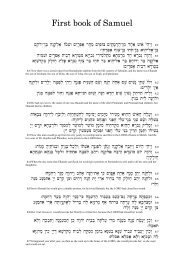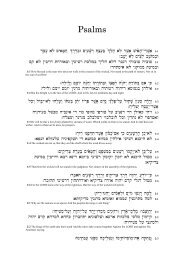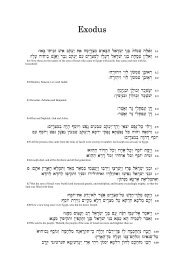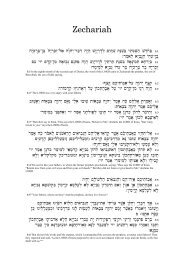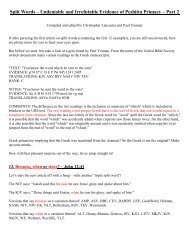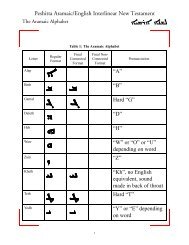ana translation
Untitled - Peshitta Aramaic/English Interlinear New Testament
Untitled - Peshitta Aramaic/English Interlinear New Testament
- No tags were found...
Create successful ePaper yourself
Turn your PDF publications into a flip-book with our unique Google optimized e-Paper software.
126 SUPPLEMENTAL NOTES.<br />
[3 JOH. 10-12<br />
the five inferior ones above noted, that is, of all the five oldest, and<br />
eight of the twelve later (eighteen in all being here available). In<br />
this case Arab, agrees with the older text, and with Harkl. The<br />
Harkl. translator notes that (frXvapwv was an unusual word, and perhaps<br />
betrays his consciousness that his rendering of it is hardly adequate,<br />
by inserting it in Gr. characters on his marg. The Latin of Etzel<br />
("facit in nos"), of Pococke (" facit nobis"), and of the Polyglots<br />
(" tractat nos"), alike show the difficulty they felt in dealing with their<br />
Syriac text, ^A 'plCO .<br />
Ib.<br />
For Ol^ *QlD (impersonal, third pers. preter.) the ptcp.<br />
- en<br />
(agreeing with the subject) is more usual, and is read here by some<br />
codices. See Pococke's note in loc., and cp.<br />
Mt. vi. 34. Harkl. supports<br />
our text as printed supr.,<br />
and a parallel for it is to be found in Syr.-<br />
Hxp. (Prov. xxx. 15).<br />
The various points and other marks attached<br />
to the word in many of our copies (see footnote in loc., p. 29 supr.) show<br />
that it was a difficulty to the scribes.<br />
Ib. Philox. (all texts) writes \^oVr>% . V ]1 T^V<br />
7riSe;(o/AeVovs,<br />
with C and some mss, and supported by some Latin.<br />
Harkl. follows<br />
the other MSS and most mss, and the best Latin, which give TOUS<br />
ftovXofjLwovs ( v<br />
>0 . J .QJOL1) ;<br />
but in marg. a inserts ^>\noV>> as<br />
alternative, whether deriving it from Philox., or from a Greek exemplar,<br />
is doubtful.<br />
11. All editions of Philox. prefix O (= KCU) to o<br />
t<br />
ov* Q01<br />
( = 6 KaKOTroiaiv) ;<br />
but codd. 1, 19 omit the copulative, as does Harkl.,<br />
agreeing with all Greek MSS (except L)and many mss. Our other codices<br />
insert it, except 18, which instead of it subjoins ^j ( = &0 to OO1,<br />
thus agreeing with L and many mss which write 6 Se Ka/coTr.) ;<br />
and so<br />
also Arab, and Etzel. No Greek reads KOL 6 K. As the prefix O does<br />
not usually or properly represent 8e, and as ^i> (the proper equivalent<br />
of Se)<br />
is so weakly attested, I prefer to follow 1,<br />
19, as in text supr.<br />
12. Nearly all our codices, Arab., Etzel, and all editions, read<br />
IZplj dllV)O before *|j;J OliSoo, as if the Greek were KCU VTT av-njs<br />
TT}S eKKXrjaias /cat VTT avrfjs T^S a\r)0ias, which is substantially the reading<br />
of C and of the Armenian version. Cod. 1 (alone) omits (2,1) OlllVoo<br />
altogether. Cod. 14, on the other hand,<br />
inserts it and omits OUloo<br />
p^s? (which seems to have been originally the reading of A). But 1



